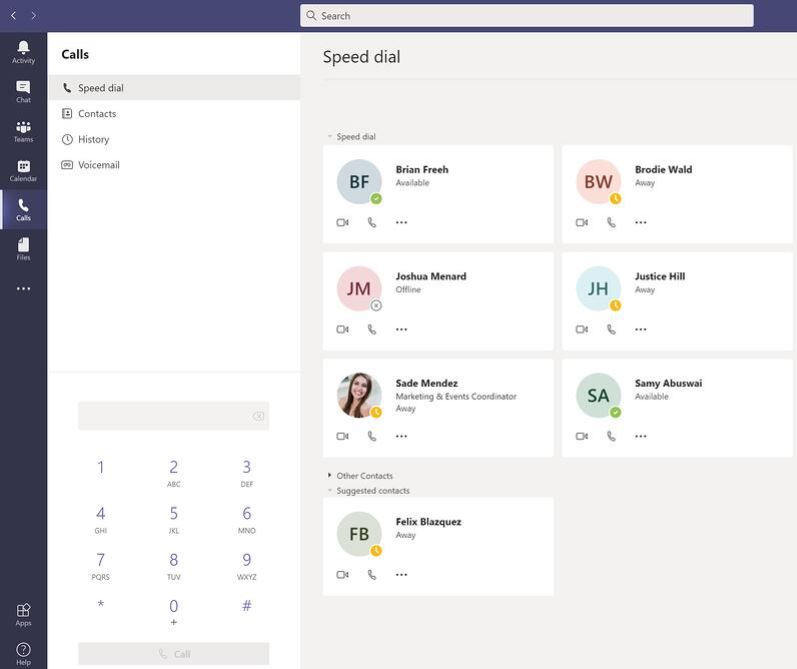BVoIP has rolled out functionality that lets Microsoft Teams users extend that product’s native voice capabilities.
Called Nucleus for Microsoft Teams Voice, and introduced alongside an all-new unified management portal and an overhauled pricing scheme, the system augments Microsoft’s basic voice technology with advanced contact center features from BVoIP’s flagship unified communications solution, such as call queuing, custom on-hold music, call recording, and call reporting.
It also lets businesses draw on BVoIP’s 1Stream integration platform to create automated links between Teams and ticketing platforms like ConnectWise Manage and Datto’s Autotask PSA, or CRM systems from Salesforce, HubSpot, and others.
“We’ve merged the best of both worlds,” says George Bardissi, BVoIP’s CEO. “We took a very strong voice contact center and integration platform and merged it with the native Microsoft experience.”
Users access the system from within the same Teams interface they use to chat with co-workers, share files, and perform other tasks, rather than a dedicated app they must install separately.
Nucleus is based on Microsoft’s “direct routing” functionality, which links Teams to third-party telephony networks that remain available for making and receiving calls even when Teams is unavailable or experiencing poor performance.
Direct routing makes Nucleus more profitable for partners as well, according to Bardissi. Channel pros who add VoIP to Teams via Microsoft’s SMB business voice plan pay $20 per user per month (currently $15 per user a month for the first year under a promotional offer set to expire next April), and receive no margin in return. Nucleus users, by contrast, can buy Microsoft’s Phone System Direct Routing SKU, which generally costs less than half as much, instead but still charge clients the same $20 fee or more.
“You’re going from a very basic solution and you’re adding a whole bunch of other things on top of it,” Bardissi says.
Nucleus offers flexibility on licensing that can further boost margins. While Microsoft requires Teams business voice customers to purchase seats for all of their users, BVoIP lets partners pick and choose which users actually need calling features.
“If you have 50 users and only 10 need the Microsoft phone system experience, your cost per user is a lot lower,” Bardissi says. “You can mix and match and immediately start to make money.”
Nucleus provides greater flexibility on hardware as well, he continues. Businesses that wish to attach desk phones and conferencing gear to a standard Teams deployment are restricted to Teams-only devices incompatible with other voice platforms. Nucleus subscribers, however, can use standard VoIP hardware.
“You can repurpose what could be an existing investment in devices without having to rip and replace,” Bardissi says.
All BVoIP users except a small number on discontinued legacy plans can begin using Nucleus immediately at no additional cost.
That’s one of several ways BVoIP has updated its five subscription plans. All of those plans now include 1Stream integration functionality at no extra charge as well. In addition, partners can for the first time choose between BVoIP’s traditional pricing, which is built around bundles of concurrent communication channels, and per-user rates.
According to Bardissi, per-user fees are likely to be an economical option for “micro-businesses” with a handful of users, and a simpler consumption model for MSPs that price all of their other services per user. Channel pros who serve organizations like K-12 schools with lots of users who don’t need their own phone line, he predicts, will probably stick with channel-based licensing. Partners are free to use different models with different customers, and switch customers from one model to the other as their needs evolve too.
“We want to give them as much flexibility as possible,” Bardissi says.
All of BVoIP’s revised plans include Control, the vendor’s new management interface, at no extra cost. Designed to provide single sign-on access to unified administration and security functionality previously available through multiple tools, Control also comes with enhancements like built-in audit reporting and a consolidated cross-account monitoring console called PBX Radar.
Technicians can also enable and disable multifactor authentication for multiple users now and centrally manage user permissions. The latter feature will play a critical role in a forthcoming enhancement due next year that will let MSPs offer their clients self-serve access to some Control capabilities.
“Down the road, our goal is to be able to give our partners the ability to extend Control into a view and a presentation for their end customer,” Bardissi says.
Nucleus and Control are two recent and especially significant instances of the more than 220 enhancements BVoIP has rolled out during 2020, which Bardissi calls the company’s “year of updates.” He plans to continue shipping revisions at a rapid clip next year too.
“We’re keeping the pedal down,” he says. “Frankly, we have a very, very long roadmap ahead of us.”














